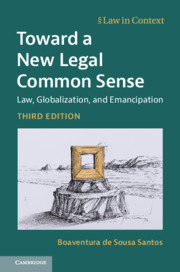Book contents
- Toward a New Legal Common Sense
- The Law in Context Series
- Toward a New Legal Common Sense
- Copyright page
- Dedication
- Contents
- Preface to the Third Edition
- Preface to the Second Edition
- Acknowledgements
- 1 The Tension between Regulation and Emancipation in Western Modernity and Its Demise
- 2 Toward an Oppositional Postmodern Understanding of Law
- 3 Legal Plurality and the Time-Spaces of Law: The Local, the National, and the Global
- 4 The Law of the Oppressed: The Construction and Reproduction of Legality in Pasargada
- 5 Globalization, Nation-States, and the Legal Field: From Legal Diaspora to Legal Ecumenism?
- 6 Law and Democracy: The Global Reform of Courts
- 7 On Modes of Production of Social Law and Social Power
- 8 Law: A Map of Misreading
- 9 Can Law Be Emancipatory?
- Postface as Disquietude
- Bibliography
- Index of Names
- Index of Subjects
2 - Toward an Oppositional Postmodern Understanding of Law
Published online by Cambridge University Press: 08 October 2020
- Toward a New Legal Common Sense
- The Law in Context Series
- Toward a New Legal Common Sense
- Copyright page
- Dedication
- Contents
- Preface to the Third Edition
- Preface to the Second Edition
- Acknowledgements
- 1 The Tension between Regulation and Emancipation in Western Modernity and Its Demise
- 2 Toward an Oppositional Postmodern Understanding of Law
- 3 Legal Plurality and the Time-Spaces of Law: The Local, the National, and the Global
- 4 The Law of the Oppressed: The Construction and Reproduction of Legality in Pasargada
- 5 Globalization, Nation-States, and the Legal Field: From Legal Diaspora to Legal Ecumenism?
- 6 Law and Democracy: The Global Reform of Courts
- 7 On Modes of Production of Social Law and Social Power
- 8 Law: A Map of Misreading
- 9 Can Law Be Emancipatory?
- Postface as Disquietude
- Bibliography
- Index of Names
- Index of Subjects
Summary
In this chapter, I argue that the conversion of modern law into scientific state-centered law went hand in hand with the conversion of modern science into a hegemonic rationality and a central productive force. I concentrate in the gradual process whereby modern law came to be dominated by science and the state. I claim that in this process law lost sight of the tension between social regulation and social emancipation that was imprinted in its roots in the paradigm of modernity. The loss was so thorough and irreversible that the recovery of the emancipatory energies called for in this book must involve a radical unthinking of modern law. The first section analyzes the original imprint of the tension between regulation and emancipation in modern law, selecting three of its major moments: the reception of the Roman law, the rationalist natural law, and the theories of the social contract. In the second section, I analyze the historical process by which this tension was eliminated by the collapse of emancipation into regulation, distinguishing among three periods of capitalist development: liberal capitalism, organized capitalism, and disorganized capitalism. Finally, I state the major topics for the unthinking of law in the transition between social paradigms.
Keywords
- Type
- Chapter
- Information
- Toward a New Legal Common SenseLaw, Globalization, and Emancipation, pp. 24 - 98Publisher: Cambridge University PressPrint publication year: 2020

